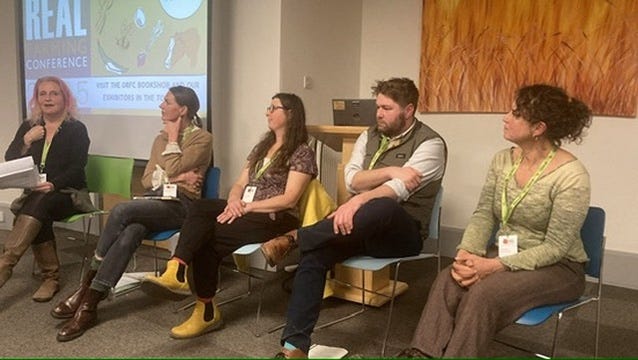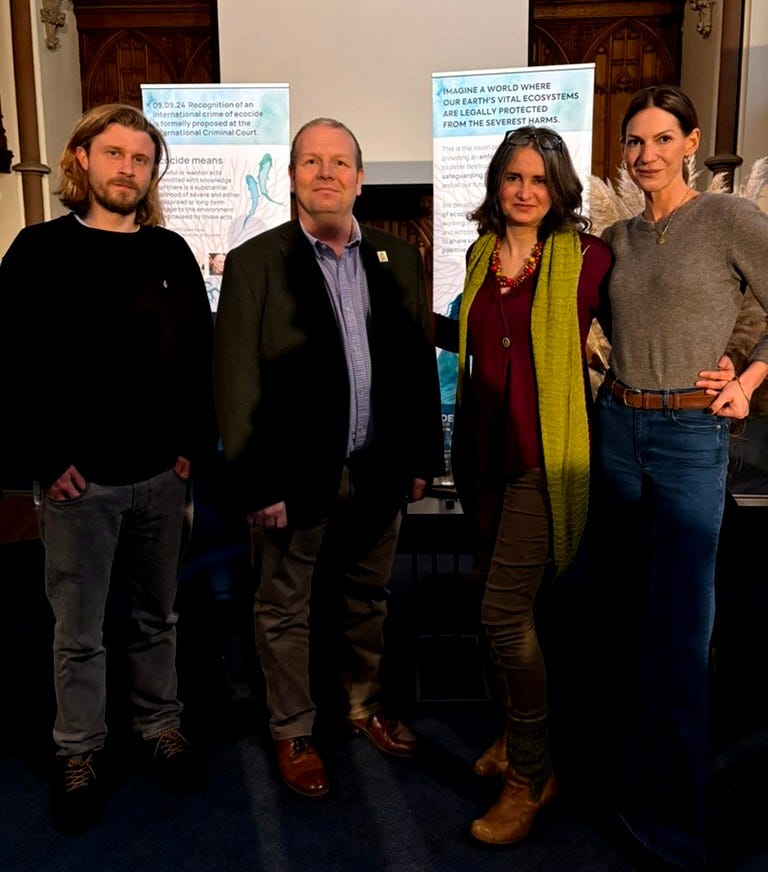Well that didn’t go to plan, did it…
You tried: I know you tried. I asked you to hold me accountable on the three resolutions I said I wanted to bring about: making an edible garden out of a fenced grass square, posting this substack weekly, and not buying any new clothing all year.
You posted kind comments. Shared with supportive words. A woman I’ve never met got in touch and offered me a plant from her garden in East London to put in the blank space of mine. My kind friend, writer Helen Rebanks, even bought me a pair of gardening socks.
Friends: the fenced grass square is still a fenced grass square. Just with a few more weeds in it than two months ago. And the fact this is dropping into your inbox eight weeks after my first substack tells its own story.
I have at least managed my final resolution and have been writing a piece about it, stumbling across all sorts of interesting people and places in the process, which I will tell you another time.
I can only really explain my failure to keep my first two resolutions like this. Life at the moment is a bit like swimming in the ocean: warm bits, cold bits, and every now and then a wave that threatens to drown me, but I know the shore is there and if I just keep swimming I’ll reach it in the end.
But now I will take my own advice, written here back in January.
Start again. Get back up and start again.
So instead of focusing on what I haven’t done, I shall tell you a few of the things I have done, posting each lunch time this week before starting weekly newsletters again in March. Maybe some of it will sow a seed or ignite an idea, or just be interesting to listen to. That’s how ripples work, I guess: spooling out until they become a wave.
Keep swimming my friends.
First Up…
Oxford Real Farming Conference
It is the best kind of way to start a new year. I wrote a bit about why on instagram.
On Wednesday night I went along to the first ever collaboration between the Oxford Farming Conference - suits and lanyards - and the Oxford Real Farming Conference - hemp smocks and songs.
The Oxford Farming Conference began in 1936 and was, up until 2010, the main farming conference for those in agriculture in the UK and beyond. Then in 2010 a group of farming rebels - Ruth West, Colin Tudge and Graham Harvey - founded an alternative conference for all those dismayed and disillusioned by the direction conventional agriculture had taken. In possibly the most passive aggressive move of all time they put it on in the same city, at the same time, and called it The Oxford Real Farming Conference.
The ORFC now has over 60 sessions, 400 speakers, 2,000 in person delegates and claims to be the largest agro-ecological gathering in the world.
For the last two years I've been one of a handful of people who have spoken at events at both conferences. I see this as a sign that there is more shared space in the middle than people might think. Up until now, however, official collaborations between the two have not happened despite the best efforts of a few good people I know. That is why this dinner was such a Big Deal.
It was put on by three people who, together, I suspect could probably run the world: Sue Pritchard (Food, Farming and Countryside Commission), Josiah Meldrum (Hodmedods) and Jimmy Woodrow (Pasture For Life).
We ate, drank, listened to tub-thumping speeches by author of English Pastoral James Rebanks, Sue Pritchard and Tony Juniper. It said a lot about who was there that the longest and loudest applause was saved for the chefs and kitchen team, who had bent all the usual rules to serve up a supper where we knew about the provenance of everything we ate and how it had been grown in a way which helped restore nature.
Right To Roam
The next day, I spoke on a panel put together by writer Amy Jane Beer.
I know Amy as our books were both nominated for a Wainwright writing prize (she won; I didn’t…). She is part of a collective passionate about allowing more people access to land. But she saw how important it was for the Right To Roam campaign to include rather than alienate landowners, farmers and tenants by tackling some of the divisive issues like littering, open gates, dogs and other nuanced problems which can make the debate so polarising. So she started an Access Friendly Farmers Whatsapp and asked me to be on it. I gave a quote about it to the Guardian last year, here.
I sat alongside Debra Willoughby - tenant farmer in Loughborough - Romilly Swann - tenant shepherd in the Chilterns - and Guy Thallon - head of natural environment at Castle Howard. We talked about rights and responsibilities, how to motivate farmers and land owners to let people on their land (my answer: pay them…), what the blocks and barriers are and how we might overcome them.
We got into it. Sometimes these kinds of issues can feel insurmountable, so delicate is the balance between different people’s needs, expectations and attitudes.
But then afterwards I had a conversation which changed that. In the audience was someone a friend had brought: a Texan who had come to the conference mostly out of curiosity. Later, at dinner, he said how mind blowing the whole concept of Right to Roam was to him.
‘Where I come from, if I walked onto someone else’s land I’d be risking getting shot’.
It made me think a lot, that comment. He’s not the first American I’ve spoken to about their astonishment that in the UK some people think it's okay to trespass. Or that in Scotland, there is a right to roam responsibility wherever you like enshrined in law. And how some people believe that nature can never really be owned anyway.
More than anything, the conversation with him that evening made me think about freedom. Not just the freedom to walk somewhere - public footpath on private land or wilful trespass - and not fear in any real way for your life, but also the freedom to have the kinds of conversations we did that day. To disagree, to say controversial things, to explore ideas in a public space even if - or so that - your mind is then changed by hearing another’s view. It is a precious thing this, and we must guard it so.
If you want to know more about this subject, Patrick Barkham wrote about the panel here and Country Life Magazine also wrote about it here.
Stop Ecocide
On Friday I chaired a panel which debated whether a law of ecocide could help a transition to agro-ecological farming. This is something I’ve become borderline obsessed with in the last year, thanks to a weird coincidence involving Ecocide Founder, the late Polly Higgins, being married to one of the favourite people from my old barrister’s chambers, Judge Ian Lawrie.
Despite being the morning after the night before, the church was packed with a terrifyingly knowledgeable audience including Craig Bennett from the Wildflife Trust, Shelia Das from the National Trust, Josiah Meldrum from Hodmedods, and some loyal mates like James Robinson, Claire Whittle and Ben Andrews.
On the panel were JoJo Mehta (Stop Ecocide), Rob Percival (Soil Association), Martin Lines (Nature Friendly Farming Network). I took them into the weeds of what the law is meant to be. Too often I think we forget it is not something handed down from high or God-given, but a reflection of who we are as a society and what we want. It is flexible. We can change it if, and have done so many times before, if we are able to create a tipping point that enables that happen. I even got to tell my (okay The Judge’s) favourite Luther story, but if you want to hear what that is you’ll have to watch the session all the way to the end I’m afraid.
And if you’re interested in the fact that House of Hackney and Lawyers for Nature managed to get the dictionary definition of nature changed - from one that defined nature as anything that isn’t human (thereby framing the way we have seen and treated it) - so that the Oxford English Dictionary has removed the label "obsolete" from a secondary definition of "nature" that encompasses "the whole natural world, including human beings", then we get into that too.
As Rob makes clear, it’s not over however. The main definition still contrasts nature with humans and human creations. Have a look at the campaign to change this here.
Okay: that’ll do for now.
Until tomorrow lunchtime….(she says)
Sarah x








Glad you’re back.
Re right to roam, nature is surely the only one with this right. Any impingement by mankind can be taking a liberty, some of us hopefully have earned this right but we still need to excersise it with utmost respect.
D.